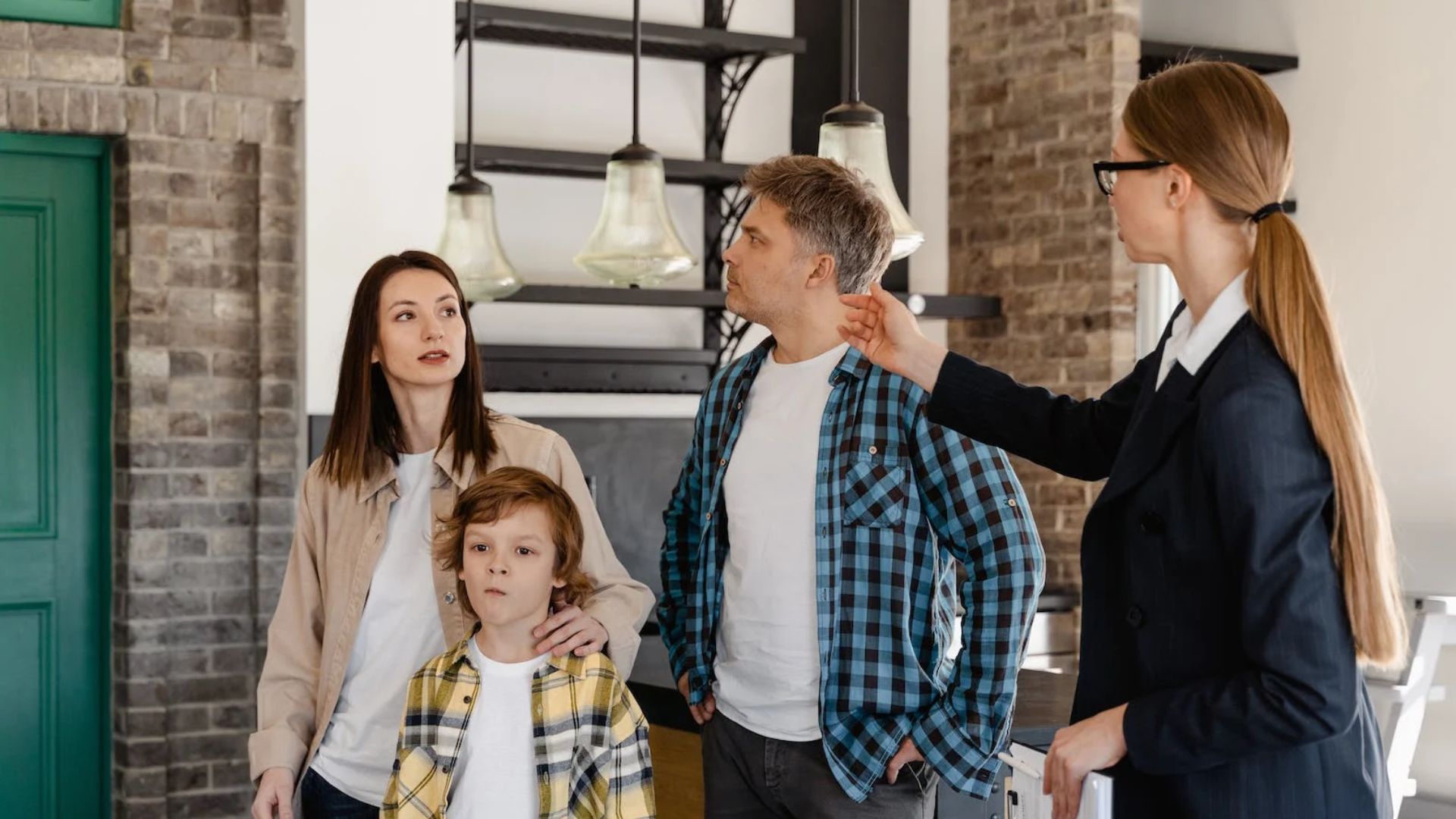
Sell And Buy A House: How Do I Do It?
Looking at how you can buy and sell a house at the same time, whether it is better to sell a property first or you should buy a house first and how an estate agent can help.

Alexandra Ventress ★ Digital Content Writer
Table of Contents
Buying or selling a house can be a difficult business when done individually, let alone if you find yourself in the position of buying and selling a house at the same time. The process involves paperwork, estate agents, solicitors, and more, and it can be easy to find yourself feeling overwhelmed fast.
In this blog post, we are going to be looking at what it means to be both a buyer and a seller on the open market, the advantages, and disadvantages of selling or buying first, and how you can give yourself the best chance at a stress-free sale.
What are buyers categorised as?
When it comes to selling your house, chances are you will be categorised in one of four ways by any potential estate agents.
If you have already sold your property and have moved in with family or friends, or to a rental property then you will be in a great position as a buyer. As you have already sold you will know exactly what property you can afford to purchase, there will be no property chain involved with you and you can proceed with the sale immediately.
If you are classed as under offer when looking for a new house, then you will also know exactly what your budget is. Whilst deals can still go under during this stage of the process of selling, it is still a good position to be in.
If you have a property to sell on the market this means that whilst you don’t have any offers yet, you are still ready to get the ball rolling. You may not be taken quite as seriously as they may take those who have no property to sell, or who are under offer, but you will still be viewed as a motivated buyer.
Estate agents may take into consideration the following:
- How hot or cold the market is at the minute
- If you have set a realistic asking price
- The length of time you have been on the market
Often regarded as the weakest position a buyer can be in, being classed as having a property to sell will mean that your home is not yet on the market, but you have the intention to sell. If you were to make an offer on a property at this stage of the selling process, many estate agents would advise their clients to reject your offer altogether due to the fact that you will have no idea about your true buying price at this point.
Advantages of selling a house first
Easier to secure a mortgage – If mortgage brokers do not have to service your old mortgage, they will be more likely to offer you a new one. Once you have sold your old property, it is a much simpler process to apply for a new mortgage, rather than waiting for your old one to run over.
Not sale dependent – If you find the net home you want to buy, but another buyer shows interest as well, having sold your old property first can go in your favour. Sellers will mark you as “non-sale dependent” and will be more likely to sell to you as you won’t be stuck in a property chain and do not need to sell your current property to purchase your next one.
Less stress – As you will have already sold your first property, you will only have to focus on the house purchase, rather than dealing with the very stressful situation of selling your old home whilst buying your new one.
More time – When you sell first, you allow yourself more time to find the best property that you can. Because you are not having to worry about selling within a certain time frame or worrying about getting the asking price you want, you can focus fully on finding the perfect home for you.
Maximum bid – Once you have sold your current home, you will know the exact budget that you can afford for your next home. You won’t have to worry about being able to afford the property as you will have the amount you can afford in the bank and will know exactly how much you can bid.
No onward chain – If you are planning on buying a new one after selling your present property then that means that you don’t have to waste time stuck in a chain, waiting for the next sale to go through before you can start yours.
Disadvantages of selling a house first
Offer acceptance – Because you are in no rush to find your new home, it means that when it comes to accepting offers you can find yourself taking your time, looking for the best one. Whilst this is all well and good in theory, it can mean that you find yourself stuck in limbo, not leaving the offer stage for quite some time.
Rising market prices – Another downside that you will need to consider when selling your house first before buying is that the market is volatile and prone to change. You may find yourself having to settle if the perfect property does not crop up in time due to rising values.
Finding accommodation – The biggest downside to selling your property before buying is that you will be left without accommodation after the sale has been completed. You will need to find somewhere to stay whilst you look for your new property. This can mean staying with family, friends, or maybe renting somewhere. But it is worth bearing in mind that you could find yourself displaced for quite some time and the minimum rental contract is usually around six months.
Problems that can occur when buying and selling a house
As with any house-buying adventure, when it comes to buying a property and selling your old home at the same time, problems can occur. Chances are you will be in a housing chain, which means you will be reliant on someone else in the chain buying another property in order for you to buy yours.
Some of the most common issues that can arise in this situation include:
When you decide to buy your new property and sell at the same time, you will need to factor in mortgage applications and how complicated they can become as they can often take longer than expected.
Survey findings can have a large impact on buying a new home and selling at the same time. If an issue is discovered with the property, it can cause delays or even the collapse of a housing chain.
The most common issue that can occur when it comes to buying and selling a home at the same time is that people get cold feet and want to back out of the sale. When this occurs it is extremely frustrating, as it means you will not be able to buy your new home until the sale of your current property has been completed.
As given away by the name, all the properties in the chain are linked to each other. Meaning even the smallest ripples at the bottom of the chain can be felt all the way to the top. When taking part in any property purchase you can expect to experience delays when it comes to your completion day.
A surprising number of selling and buying issues stem from bidding. The amount of power your own bid holds depends entirely upon sale dependency, onward chain after offers, or you are outbid while someone has a bud on in your home.
The selling and buying a house process
If you have decided to start the process of selling and buying at the same time it can be easy to feel overwhelmed and out of your depth. Whilst it is easier said than done, it is important not to panic, as the good news is that it is fairly commonplace, and selling a home and buying a property at the same time is the route that most homeowners choose.
To help you start your selling and buying journey, we have created our handy guide to help you through the process:
1. Value your property
As you are selling and buying at the same time, you will need to get an idea of how much your home is worth so you will be able to find a property within your price range. The best place to start is by using free online valuation tools. To do this you will need to enter basic information about your property such as the postcode, size, condition, and how many rooms it has. From there you should be able to receive a basic valuation for how much your property is worth.
The next step you can take is inviting three local estate agents round to your property to give you their valuations to sell your home. They will be able to assess your property and give you a personal valuation. Once you have received all three valuations you will be able to work out the average price of your property and go from there.
It is worth bearing in mind that some estate agents will overvalue properties in the hopes of winning business, so consider all three valuations carefully and avoid starting your selling journey with a high asking price that you will have to reduce in a few weeks.
2. Sort out your finances
One key aspect of selling your home before buying property is working out your finances. By having a proper handle on your finances, you are putting yourself in the best position to get the most out of your current home and new house. You will need to work out how much you can afford to spend on your next house and how much equity you have in your current property.
You will then need to consider the property chain. When you find the next property, you want to buy, you will need a deposit when you exchange contracts. It is always a good idea to exchange on the same day as your buyer does, as you will be able to use the deposit that they pay to you to pay your deposit on the property you are buying.
However, if you want to purchase a new home that is more expensive than your current house, then you may end up paying more for your deposit than you receive. If this is the case, then your solicitor may be able to agree with the seller’s solicitor that a smaller deposit will be enough, but if this cannot be done then you will need to find the extra cash. Before you start this process, it is a good idea to work out whether you will be able to afford this.
3. Mortgage Broker
When you are selling your house and buying a new property alongside each other, a mortgage broker is someone who can help guide you through the process. They will be able to advise you about whether you should remortgage or port your mortgage.
They will also be able to warn you of any early repayment charges you might have to pay if you take out a new mortgage before you have paid back your original mortgage.
4. Find your EPC and prepare your main documents
One of the first things you will need to do when you decide to sell your property is to find your Energy Performance Certificate or EPC. An EPC is a document that ranks your property on energy efficiency from a scale from A to G, with A being the most energy efficient and G being the least. Before you can put your property on the market, you will need to ensure that you own an EPC or that you have had a new one commissioned as it must be available to show any prospective buyers.
EPCs last 10 years so if you have bought your property within the last decade, you will not have to buy another. It may end up costing you more, but most people go through their estate agents to get a new EPC. You can also get an EPC independently by going through local Energy Assessors in your area.
If you are looking for a quick house sale or purchase, then it is critical that you have your main documents to hand and ready to go. By having these documents ready from the get-go, you can help to avoid any delays.
5. Prepare your home for sale
If you want to sell your property quickly, it is important that you prepare your home for sale. By correctly preparing your home, you can help to achieve the best price possible and a quick sale. In order to generate interest in your property and get a buyer to buy your home, you will need to make some small changes to your property.
Simple tasks such as:
- Decluttering your property and moving any furniture that makes your room look small
- Lightening your room with a fresh coat of paint in a neutral colour
- Boosting your kerb appeal by mowing the lawn, planting fresh flowers, cleaning the patio, and repainting any tired looking fences
6. Choose your estate agent
Now that you are ready to put your home on the market, it is time to choose your estate agent. You should be looking at how often the estate agent achieves the asking price, how quickly they sell and check out any Trustpilot or Google reviews that they have. In order to find the best estate agent, it is important to shop around and carefully consider your options, weighing up all your different quotes.
7. Choose your conveyancer
A crucial step in the selling and buying process is sorting out your conveyancer. Whilst it may feel early to start looking for conveyancers, it will mean that when the time comes to instruct you will be ready to go. Be sure to shop around for quotes, read reviews, and don’t rush into the decision.
8. Agree on a sale
When you are selling a property on the open market, there is no set time for how long it will take to find a buyer. The time between listing your property and receiving an offer will depend upon location, size, condition, and price amongst other factors. According to the HomeOwners Alliance, it takes an average of 10 weeks from listing to accepting an offer.
Should you be in the position of receiving more than one offer, you will need to carefully weigh up your options. Not only will you need to consider the sale price you are being offered, but you will also need to consider your buyer’s circumstances. Are they motivated? Are they reliable, or are they likely to walk away?
9. Begin your property hunt
Once you have accepted an offer, it is time to start the property search for your next property! Online property portals such as Rightmove, Zoopla, and OnTheMarket are a good place to start, as they will allow you to see what properties are available in your desired area.
10. Make an offer
Now that you have found the property that you are looking for, you are ready to start the process of purchasing. The first port of call should be to revisit your finances once again and to make sure that your new house price will fit into the budget. Does your new home require any work that will eat away at the budget? Have you factored in potential extra costs such as EPR, arrangement fees, and stamp duty?
Once you are happy with the prices you are ready to make an offer. As we have already discussed if you are under offer then you will be in a stronger position than someone who is still looking to sell their property.
11. Formalise your mortgage
Congratulations! At this stage in the process of buying a home and selling at the same time, you will have had your offer accepted! However, before you start to celebrate you will need to go back to your mortgage broker and ask them to proceed with your full mortgage application.
12. Reach out to your conveyancing solicitor
This stage of the process can be the lengthiest so it is a good idea to get in touch with your conveyancer or conveyancing solicitor as soon as you can in order to avoid delays. Your conveyancer will want to conduct local searches before contracts are exchanged.
While it can be a drawn-out process, it should all run smoothly. If you are unhappy with the lack of communication from your conveyancer, then get in touch, and if things still don’t improve you should consider asking for a new case handler.
Some areas that you will want information about include:
- If the property has any boundary issues
- If the property has undergone building works
- If there are any certificates relating to work the property may have done, such as the installation of windows or bifold doors
13. Get a survey
The next step in the process is to get a mortgage valuation for your mortgage lender. A mortgage valuation is a check to make sure the property is worth putting money against. You will be unlikely to see it as it is just a superficial check for the lender to do for their own security. If you want reassurance about the condition of the property you are purchasing, you will need to pay to have a survey performed.
By getting a survey performed you are alerting yourself to any problems that otherwise would be left undiscovered until much further down the line. There are different types of surveys that you can get done that range in thoroughness and price. Should the survey uncover anything that devalues the property, you will be able to renegotiate price, ask the seller to correct the issue before you complete, or you can pull out of the sale altogether.
14. Take charge
Communication is the key to a successful house sale, whether you are buying, selling, or doing both at the same time. Whenever your solicitor sends you documents it is critical that you read them, sign them, and return them immediately. If you read anything that confuses you, don’t be afraid to pick up the phone and ask.
15. Involve your estate agent
If you feel that the process is progressing at a slower-than-expected rate but don’t have the time to chase up your conveyancer yourself, then now is the time that you can get your estate agent involved. The Property Ombudsman Code Of Practice for estate agents states that they are obligated to monitor progress, assist you where they can, and report information deemed helpful to bringing the transaction to fruition.
16. Choose your completion date
Once you have chased solicitors, signed off on any issues, and gotten your survey results back, you are ready to set your completion date and contracts can be exchanged. It is crucial that a completion date that works for everyone is chosen as this will make the whole process a lot easier.
17. Organise your move
When you are buying a house and selling one at the same time, it is important that you make arrangements for the supply of electricity, water, gas, and telephone services. You will need to make sure that all your utilities are still working up until you move out. By planning your move ahead of time, you will be able to avoid any hiccups further down the road. You should also look at removal companies and decide how you will move from one house to the new one.
18. Completion day
Congratulations! You are now the proud owner of a brand-new house! All the prep and hard work of the last few months has gone into this day, as today you will be selling a house and buying one. When completion day rolls around, money is moved between the solicitors, and they confirm the keys can be released to the new owners. The conveyancers will then register the transfers of land ownership with the Land Registry.
Other costs involved with buying and selling a house at the same time
When it comes to selling your home before buying another property, there are extra costs that you will need to factor in when checking your final budget. One such cost is stamp duty. The good news is unless you are a cash buyer, you should be able to absorb the cost of this into your mortgage borrowing.
You will also need to factor in the cost of estate agent fees and conveyancing fees. Whilst these are necessary costs in the journey that you will need to pay, they can be easy to forget about. It is also a wise idea to factor in some extra cash in the budget for any hiccups you may experience, rather than pushing your budget to the max.
How we can help sell your house
Here at The Property Selling company, we believe that a house sale should be three things: fast, effortless, and free.
We offer you a full online estate agent service, without the fees – because it’s our mission to change the way you sell houses.
We will be working alongside you every step of the house-selling process, covering everything, so you won’t have to. The days of expensive solicitor fees and legal work are over, and our team of property experts will continue to be there, even after the process is complete.
We will market your property on popular property portals such as Rightmove and Zoopla, organise viewings, cover legal fees, and negotiate better deals all for free!
If you are ready to sell your home in as little as 28 days, then get in touch today and fill out one of our fast, free, no-obligation forms for your house valuation today!









